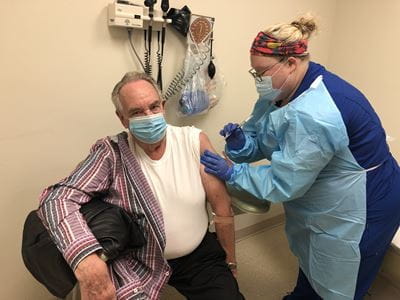Pharmaceutical giant, AstraZeneca, has published its COVID-19 vaccine data in the highly credible scientific journal, New England Journal of Medicine. Results published in the journal show that the vaccine known as AZD1222 is a safe and effective way to prevent people from getting symptomatic cases of COVID-19. More than 32,000 adults participated in the study, where they received two doses of the vaccine, four weeks apart.
More than 500 of the participants were from Indiana, as IU School of Medicine was one of more than 80 sites conducting a portion of this important study.
“We should be proud that Hoosiers were willing to step up and volunteer and be a part of this,” said Cynthia Brown, MD, who led the IU School of Medicine site for this study. “We had so much interest. We were one of the largest enrolling centers around the country.”
Overall, the results show the vaccines were 74% effective at preventing symptomatic illness 15 days or more after the second dose. Importantly, individuals who received AZD1222 had no cases of severe or critical symptomatic COVID-19, and had significantly fewer COVID-19–related emergency department visits, hospitalizations, and ICU admissions than participants who received placebo.
A key strength of this study is that it showed the effectiveness of the vaccines across all age groups, including in adults 65 years of age or older. This finding is further supported by emerging real-world data from the United Kingdom that show high vaccine effectiveness for prevention of COVID-19, including severe disease and hospitalization in older adults, after the first AZD1222 dose.
“This vaccine has been one of the predominant vaccines used worldwide,” said Brown. “More than a billion doses of this vaccine have been administered, so I think this publication will help to add to the confidence in the vaccine, both in the United States as well as worldwide.”
AstraZeneca has stated it plans to file for full U.S. approval, as opposed to emergency use, in the coming months.
The Indiana Clinical and Translational Sciences Institute (CTSI), a three-way research partnership among Indiana University, Purdue University and the University of Notre Dame, helped conduct this study at IU School of Medicine through utilization of its clinical research center and staff. The Indiana CTSI also educated people about the study through its All IN for Health program and volunteer opportunities, which enable participation in health research studies.
